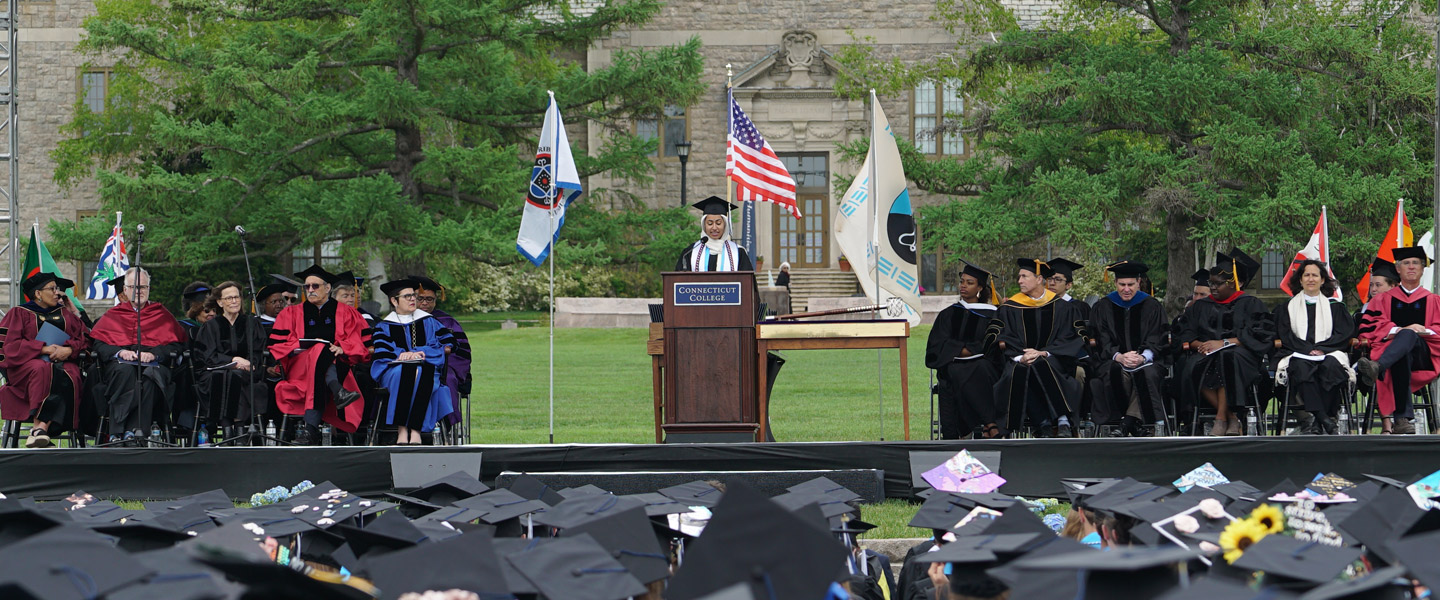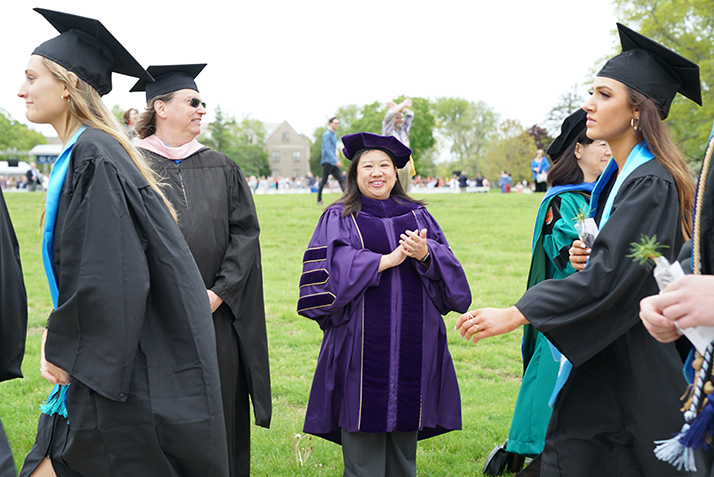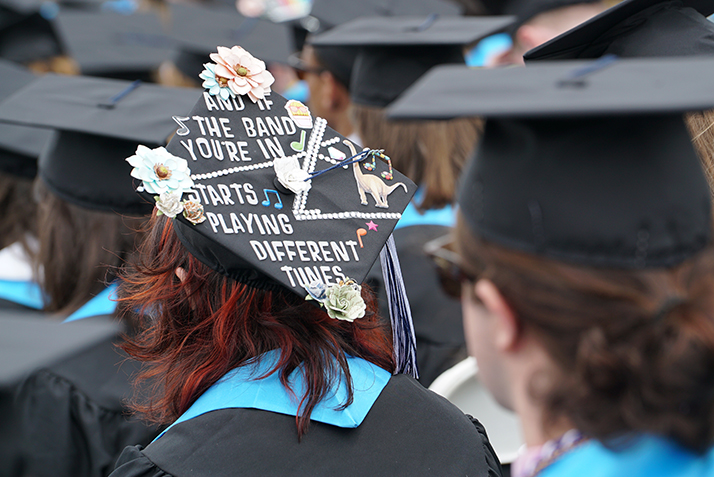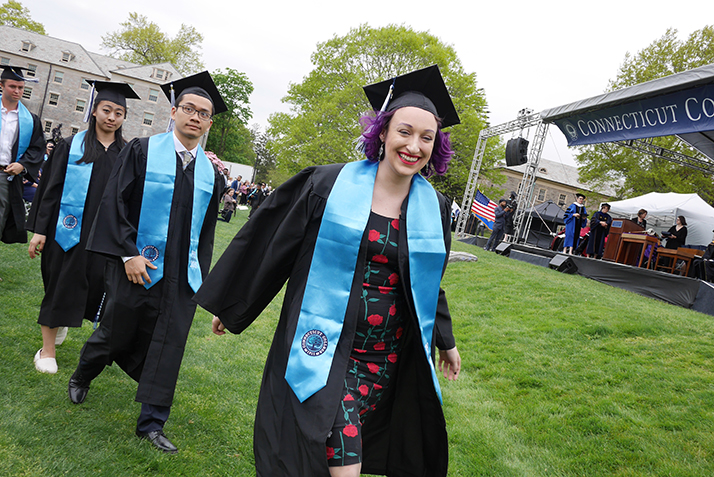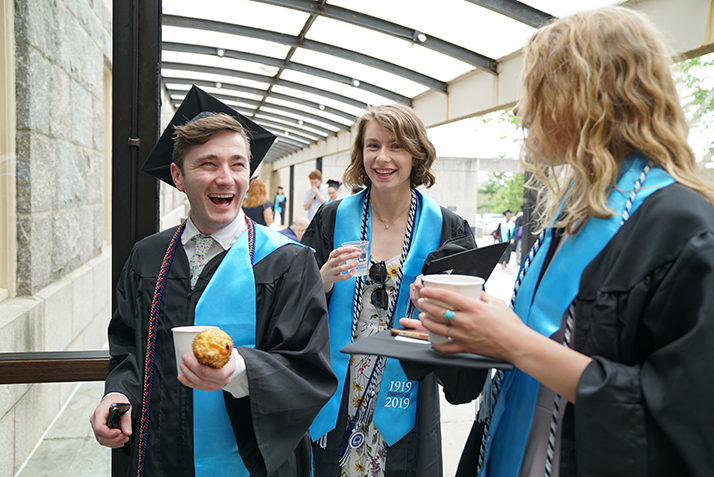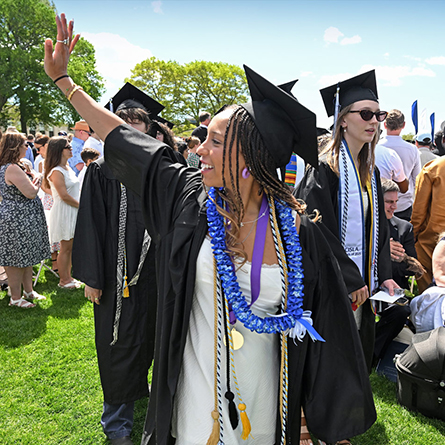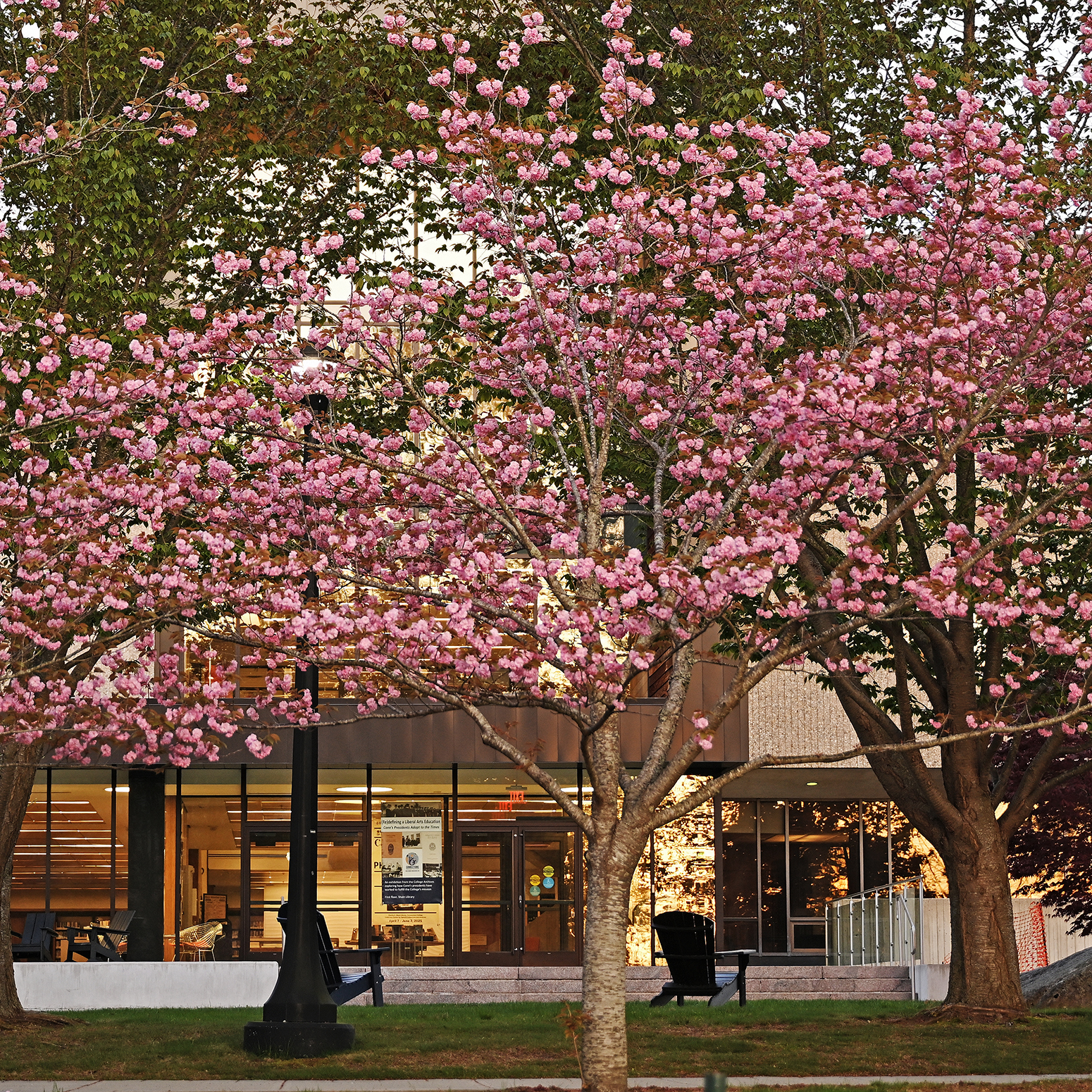
Commencement 2019
On their own college graduation days, neither Martin Chalfie or Tulle Hazelrigg planned to become scientists. They certainly didn’t believe their work would lead to a revolution in biological research and eventually, with Hazelrigg’s help, a Nobel Prize for Chalfie.
But everyone’s life is full of messy, confusing, complicated, joyful and fulfilling twists and turns, the renowned developmental biologists told the 403 members of the Class of 2019 at Connecticut College’s 101st Commencement on Sunday, May 19. Watch the entire commencement ceremony.
Hazelrigg was always interested in science as a child, she said, and even bred fruit flies in her basement to test Mendel’s laws about inheritance. But her fledgling science career was derailed when she was kicked out of her honorary science academy for protesting against the war in Vietnam.
“This was my first big mistake: to let my choices be dictated by the whims and prejudices of others. It took me some time to undo that mistake,” she said.
She majored in philosophy as an undergraduate then had a series of jobs as she pursued her various interests. Eventually, she rediscovered her love of biology, earned a Ph.D. from Indiana University and became a professor of biological sciences at Columbia University where she studies the propagation and differentiation of germ cells. There, she and her graduate student were the first to use green fluorescent protein (GFP), a jellyfish protein that glows green, in fruit flies and the first to attach it to another protein, laying the groundwork for an advance that would change the course of biological research.
“Many people discouraged me from doing the experiment because they thought it wouldn’t work,” she said. “Fortunately, by this time, I knew enough to ignore the negative comments and proved that they were wrong,” she said.
Chalfie’s career, too, was almost over before it began, he told the graduates. A disastrous independent research project in college made him lose confidence in his abilities.
“I didn’t learn from or overcome failure,” he said. “I quit.”
Chalfie taught high school for two years after graduation, but needed a summer job when school wasn’t in session. He began working in a laboratory and, with his confidence restored, returned to his alma mater, Harvard University, to pursue a Ph.D. in physiology before embarking on a 37-year career as a professor at Columbia University where he uses genetics to study nerve cell development and function.
In yet another twist, Chalfie’s most influential work—the work for which he shared a Nobel Prize—had nothing to do with the bulk of his life’s research. Instead, after hearing about GFP in 1989, he began to wonder if it could be used as a biological marker. Only one other person at Columbia—his wife, Hazelrigg—believed in the usefulness of GFP. Building on her work, he devised a research project that demonstrated that GFP could be used to see which cells had activated a gene, because they would be green with GFP, and see where proteins went in a cell within living organisms, because they brought GFP with them. “We could watch biology happen,” he told the graduates. For the discovery and development of GFP, now an essential tool in biological research, he was honored along with Osamu Shimomura and Roger Y. Tsien with the 2008 Nobel Prize in Chemistry.
“One never knows who will make the next breakthrough,” he told the Class of 2019.
“Instead of advice, I have a wish: that you enjoy your uniqueness, keep your enthusiasm and ideals, and marvel at where they take you.”
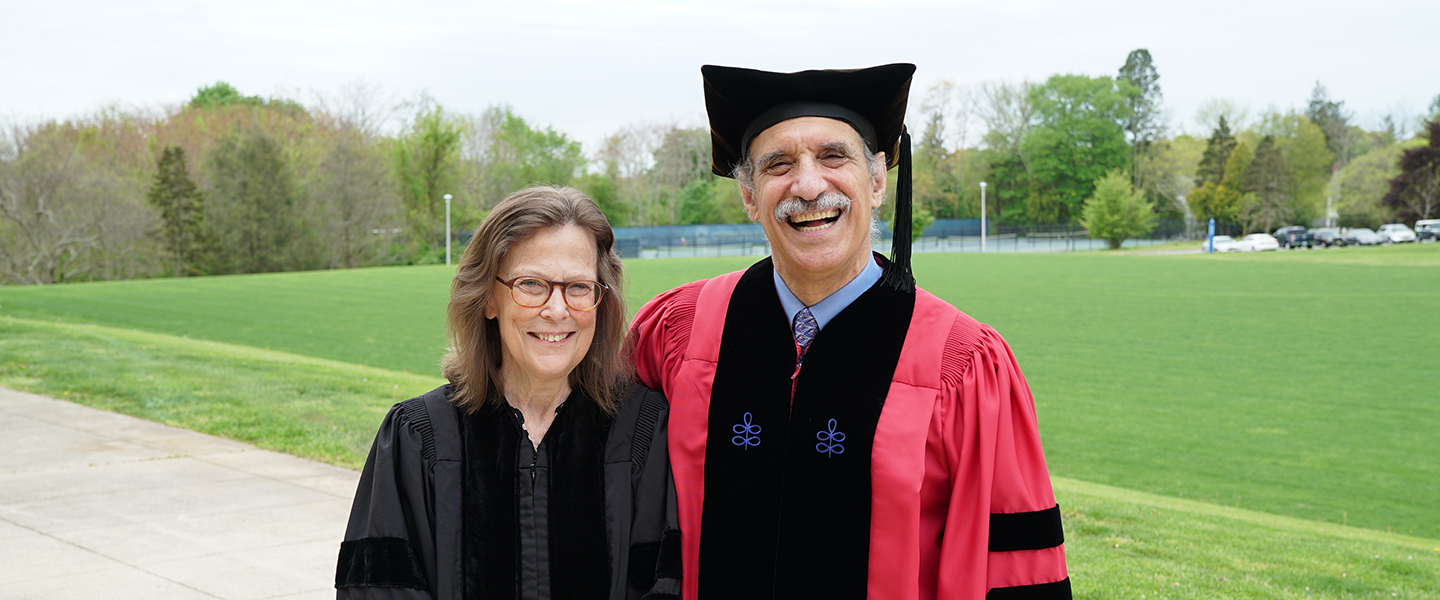
Prior to the keynote address—the first joint address in the College’s history—Chalfie and Hazelrigg were both awarded an honorary doctor of humane letters by Connecticut College President Katherine Bergeron.
During her remarks, Bergeron drew parallels between the graduating Class of 2019 and the College’s very first graduating class, the Class of 1919. Exactly 100 years after the first Commencement, she reflected on Conn’s founding as Connecticut’s very first college for women, and on the 68 pioneering students who shaped the fledgling institution from its opening day and put their liberal arts educations into action as doctors, dentists, professors, teachers, social workers, poets and journalists.
Bergeron told the story of one of those graduates, Esther Batchelder, who often went by her nickname, “Batch,” and for whom a series of Orientation events for first-year students, “Batch Blasts,” is named. At Conn, Batch served as president of the Student Government Association, participated in glee club and played several intramural sports. After graduation, she earned a Ph.D. in chemistry from Columbia and conducted research on the importance of vitamin A for dietary health among the poor, before embarking on an impressive career with the U.S. Department of Agriculture. Bergeron also pointed out that Batch was born on May 19; this 101st Commencement fell on what would have been her 122nd birthday.
“The pioneering spirit that guided Esther Batchelder at Connecticut College is still, I daresay, alive and well today. It’s the spirit of a school still uninhibited by tradition and open to the future; it’s the spirit of a place that still enjoins its students to look up, and look out, to the world beyond. It’s the spirit, in short, of an education committed every day to putting liberal arts into action, and I want you to hold that spirit close as you prepare to leave this beautiful place,” Bergeron told the graduates.
“I hope that, like the founders of this College, you will be both willing and unafraid to use the gifts that you have been given: willing to keep pushing forward when the odds seem stacked against you and unafraid to keep speaking your truth when no one else will.”
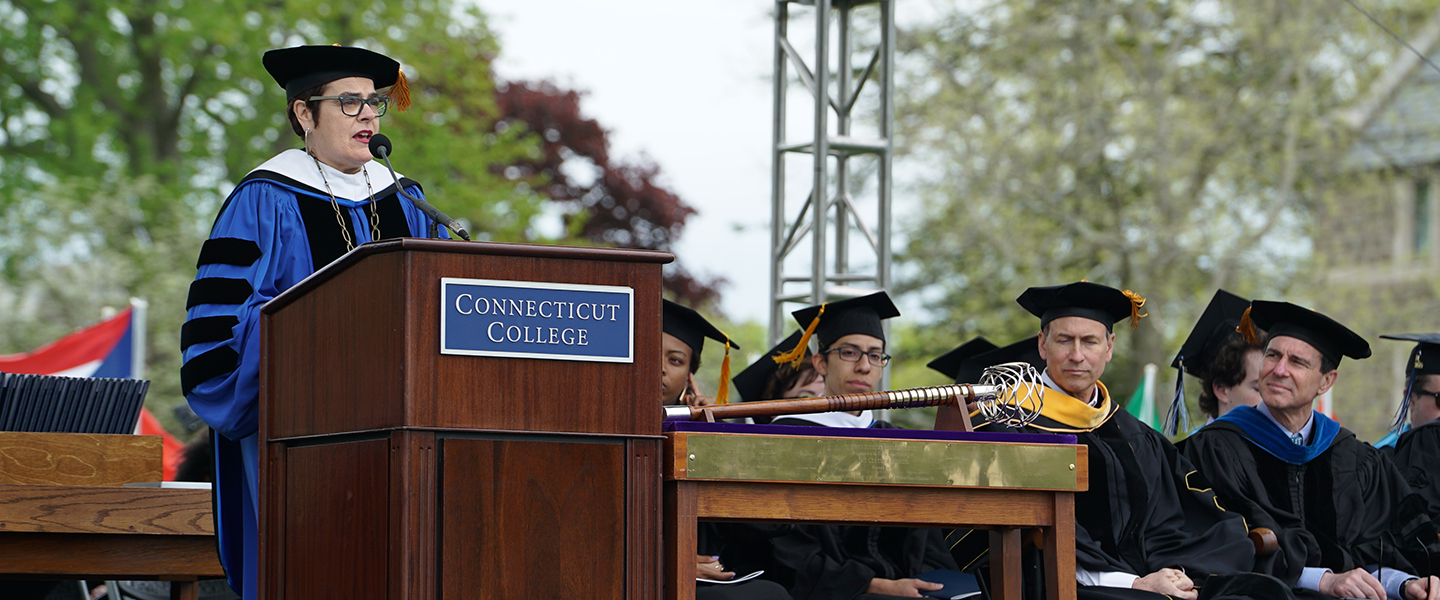
The graduates were also addressed by senior speaker Issraa Faiz ’19, an international relations major, Africana studies and film studies double minor, and Holleran Center for Community Action and Public Policy scholar from Andover, Massachusetts. While the Class of 2019 experienced college at a time of widening national political divide, Faiz said, the Conn community worked to maintain respect, tolerance and love.
“As a visible Muslim American woman, I have often been targeted by the hate in our country. During those times, I have drawn on the love of the community at Conn,” she said.
“I don’t mean love as a form of interpersonal happiness—although we do have plenty of that here, too. I mean love as a state of being. … It is radical love. Love as a response to pain. Love as a response to adversity. Love in the face of the hate.
“Through this nurturing, we have grown into strong, intelligent and compassionate change-makers,” she concluded.
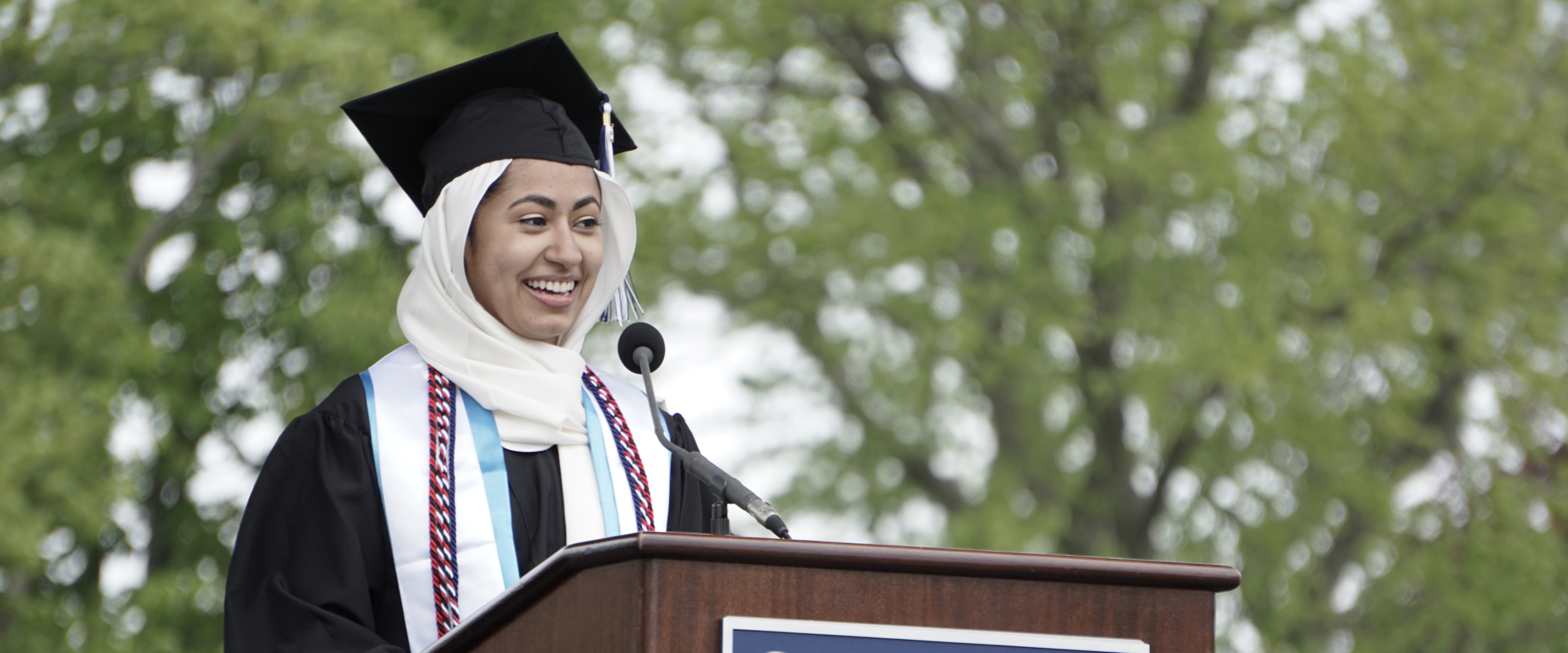
During the ceremony, the Oakes and Louise Ames Prize for most outstanding honors thesis was awarded to Samuel Simonds ’19, a film studies major, east Asian studies minor and Toor Cummings Center for International Studies and the Liberal Arts scholar from Amherst, Massachusetts. Simonds’ thesis is titled “Smoke of the Sea: A’Tolan Amis Resistance to Colonized Consciousness Through Resurgence of Traditional Epistemologies, Contemporary Existence and Collective Community.” A multipart creative project, his thesis culminated in a short dramatic fiction film—set and filmed in Taiwan—that explores the complexities of death, sickness, rebirth and reconciliation within a community whose cultural identity has been damaged by colonization and Western influence, and yet endures. In addition to the final film, Simonds’ thesis work includes 15 unique screenplay drafts in English and five additional drafts in Mandarin; a 300-page document containing a producer’s notebook, a director’s notebook and a publicity campaign; and an immersive anthropological research experience.
The College awarded the Anna Lord Strauss Medal for outstanding public or community service, including service to the College, to Rocio Cardenas ’19, a behavioral neuroscience and psychology double major and Holleran Center for Community Action and Public Policy scholar from Chicago, Illinois. A change-agent, mentor and scholar, Cardenas has demonstrated a deep commitment to social justice and full participation on campus, in New London and in her hometown community. Her extensive and impressive resume includes community work at the New London Homeless Hospitality Center, where she was an instrumental part of a team that raised $25,000 for services for New London residents experiencing homelessness; at New London’s Safe Futures, where she translated many important documents for victims of domestic violence who speak Spanish; and at the Chicago-based nonprofit New Moms, where she identified a need for translation services; among numerous other volunteer and service efforts.
At the conclusion of the ceremony, Colin Archer ’19 and George Grotheer ’19 joined Bergeron in singing the Connecticut College “Victory Song,” with musical accompaniment by the Constitution Brass Quintet. Earlier in the program, Archer sang the Alma Mater and Grotheer sang “America the Beautiful,” also accompanied by the Constitution Brass Quintet.
Commencement events began Saturday with the induction of 43 graduating seniors into Phi Beta Kappa, the national academic honor society; certificate ceremonies for senior scholars in the College’s centers for interdisciplinary scholarship; and special gatherings for student-athletes and Posse scholars. Baccalaureate, the annual celebration of the spiritual diversity of the graduating class, was Saturday afternoon in Harkness Chapel and featured a keynote address by the Rev. Elizabeth Lerner Maclay ’88, parish minister of First Unitarian Church of Providence.
Now graduates, members of the Class of 2019 are heading to locations around the world to pursue a diverse range of opportunities. Five have received Fulbright fellowships to Côte d’Ivoire, Germany, Spain and Vietnam. Members of the class have been accepted to graduate programs at Columbia, Yale, Georgetown, Duke, Johns Hopkins, University of California Los Angeles, George Washington and the University of Copenhagen, while others have accepted positions at companies and organizations including Google, IBM, Fidelity Investments, Dana Farber Cancer Institute, Bank of America, MUFG, Teach for America, Raytheon, Travelers and HubSpot.
Class of 2019 By the Numbers
- 403 Bachelor of Arts degrees awarded
- 116 double majors
- Graduates represent 25 states and 15 countries
- 167 members of the class studied abroad
- 44 are the first in their families to graduate from college
- 121 graduates earned Latin Honors (25 earned Summa Cum Laude; 31 earned Magna Cum Laude; 65 earned Cum Laude)
- 196 members of the class earned departmental honors
- 43 graduates were inducted into Phi Beta Kappa, the national academic honor society
For more on Commencement, visit www.conncoll.edu/commencement.
May 19, 2019
